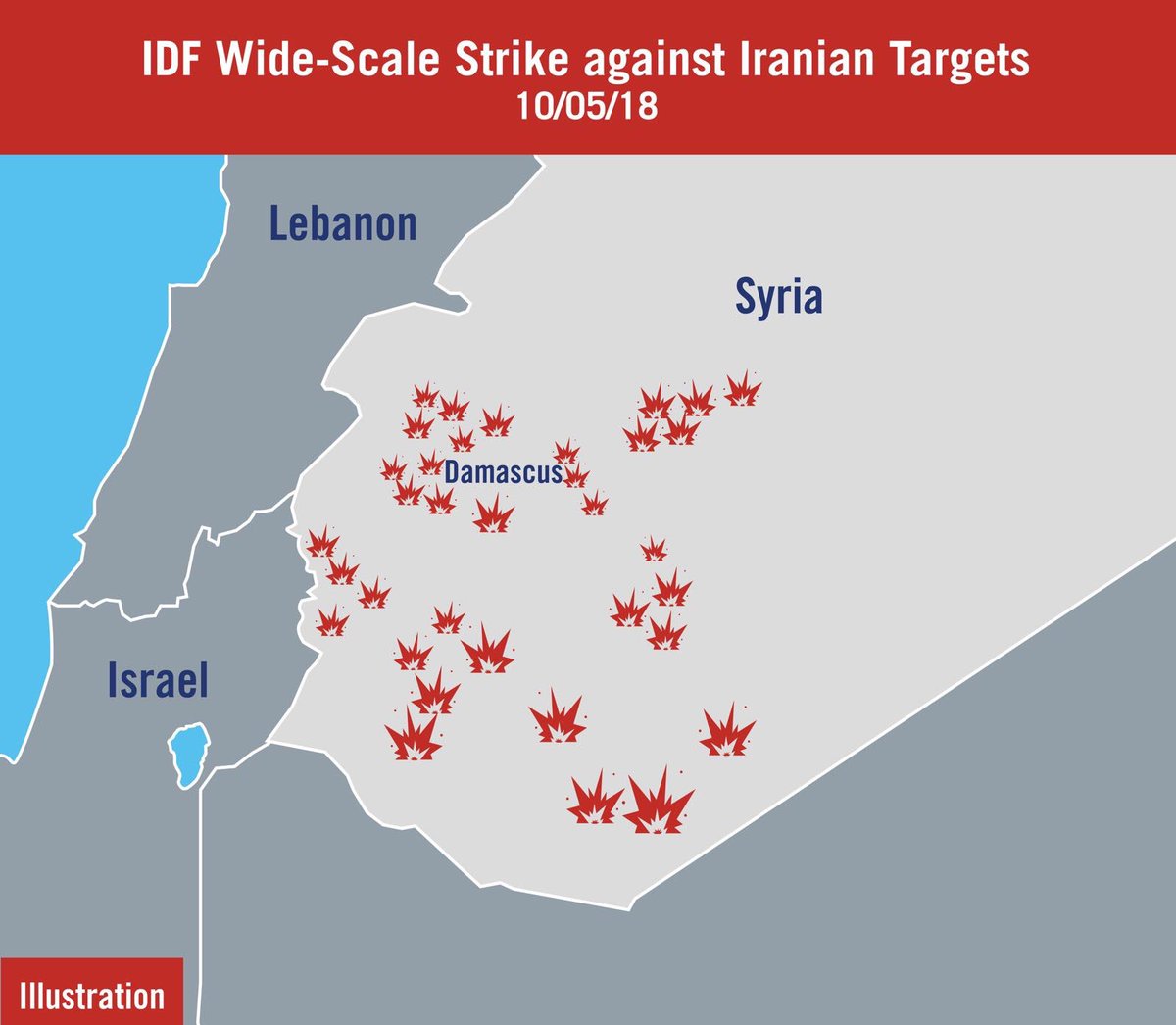IDF Strikes Iranian Targets in Syria
Iran is actively conducting its military activities beyond its borders, which not only is a threat to Israel, but to the Middle East as a whole. On Wednesday, May 9, 2018, the Quds force, a special force wing of the Iranian Revolutionary Guard, stationed in Syria, shot 20 rockets towards IDF posts in the Golan Heights. The IDF intercepted four of the rockets, preventing casualties and damage. This is the first time that Iranian forces have directly fired at Israeli troops.
In response, IDF fighter jets struck dozens of military targets in Syria that belonged to Iran’s Quds force. The IDF’s wide-scale attack included Iranian intelligence sites, the Quds force logistics headquarters, an Iranian military compound in Syria, observation and military posts, et cetera. In spite of a warning from Israel, Syrian aerial defense forces fired towards the IAF aircraft as they conducted the strikes. In response, the IAF targeted several aerial interception systems (SA5, SA2, SA22, SA17) which belong to the Syrian Armed Forces. All of the IDF’s fighter jets returned to their bases safely.
This is the second time this year that Iran has used its military facilities in Syria to attack Israel. In February 2018, the Quds force launched a UAV from Syria, which violated Israeli airspace and threatened Israeli security.
Iran’s aggression is further proof of the Iranian regime’s intentions and the threat it poses to Israel and regional stability. Iran continues to use Syria as its personal military outpost from which it can attack the State of Israel and its civilians, while the Syrian regime allows it to happen.
Overnight clashes show Shiite ‘monster’ in Syria is limited, for now
The broadly unsuccessful Iranian military response overnight Wednesday to alleged Israeli attacks on Iranian-affiliated targets in Syria in recent weeks — themselves a response to Iran’s deepening military presence in Syria, and to its launch of an attack drone into Israel in February — reveals a lot about the present Iranian deployment in Syria.Liberman: Israel destroyed ‘nearly all’ Iranian military sites in Syria
Despite the impression one might get from some Israeli reports that a real monster in Syria is threatening the very existence of the Jewish state, it emerged that pro-Iranian Shiite forces in Syria are, at this stage, limited in their capacity to attack Israel.
During Iran’s overnight revenge operation, 20 rockets were fired at Israel, of which 16 landed in Syrian territory and the other four were knocked out of the sky by Israeli missile defense systems.
It’s doubtful that this was what the Iranians or the ayatollahs had in mind when they authorized Qassem Soleimani, commander of the Revolutionary Guards’s Quds Force, to respond to what foreign sources have called recent Israeli attacks on Iranian-affiliated targets in Syria.
Not only did the operation not achieve anything — there was no damage and there were no injuries on the Israeli side — it gave Israel the pretext for a wide-ranging attack on Iranian targets inside Syria.
According to Defense Minister Avigdor Liberman, nearly the entire Iranian military infrastructure was attacked overnight. The Israeli army said this infrastructure sustained heavy damage.
What worries Israel, though, is not the attacks launched from Syria but the threat of a broader military confrontation with the much more important Iranian proxy in the region — Lebanon’s Hezbollah.
Up until now, the Lebanese Shiite terror organization has avoided being drawn into war with Israel. It is keeping its troops on alert but has not ordered them into action.
As long as Hezbollah in Lebanon remains out of the picture, the exchange of blows in Syria can continue without escalating into war.
Defense Minister Avigdor Liberman said Thursday morning that the IDF had destroyed “nearly all” of Iran’s military infrastructure sites in Syria overnight in response to a rocket barrage on Israel’s north, and warned Tehran that attacks on Israeli territory will be met with “the strongest possible force.”
In his first public comments following the strikes on dozens of targets that the IDF said were affiliated with Iran’s Revolutionary Guards’ al-Quds Force, Liberman said that Israel has no interest in escalating tensions but will not accept any provocation against it.
“If we get rain, you will get a flood,” he warned Iran, speaking at an annual Herzliya Conference. “We will not let Iran use Syria as a base to attack us from.”
“The Iranians tried to attack the sovereign territory of Israel,” Liberman said. “Not one Iranian rocket landed in the State of Israel. Nobody was hurt. Nothing was damaged. And we’re to be thankful for that. We damaged nearly all of the Iranian infrastructure in Syria.”
But he added, “It’s not a stunning victory. Everything’s limited at the moment to a confrontation between us and the Iranian Revolutionary Guards in Syria. Everyone wants to limit this confrontation and keep it in this form.”
Liberman stressed that Israel had no interested in an escalation but that Iranian provocation met with force.














































